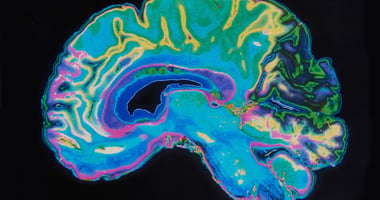Deep brain stimulation (DBS) of the ventral anterior limb of the internal capsule (vALIC) may...
Study Highlights Long-Term Benefits of Deep Brain Stimulation for Refractory Depression
 |
Previous studies suggest that up to one-third of all patients with major depression have treatment-resistant depression (that is, they fail to experience symptom improvements during two or more antidepressant trials). “Given that patients with treatment-resistant depression are highly susceptible to recurrent depressive episodes, the ability of DBS or any treatment to support long-term maintenance of antidepressant response and prevention of relapse in severe and intractable depression would be an important treatment advance,” wrote Andrea Crowell, M.D., of Emory University School of Medicine and colleagues.
Crowell and colleagues analyzed long-term follow-up data from an open-label trial of 28 patients aged 27 to 65 who underwent subcallosal cingulate DBS surgery. (The subcallosal cingulate is a small brain region rich in serotonin transporters that is believed to be a key regulator of mood.) Of this group, 20 had been diagnosed with major depressive disorder, and seven had been diagnosed with bipolar II disorder; one patient in the major depression subgroup was later reclassified as having bipolar II disorder. To be included in the trial, patients were required to have a score ≥20 on the 17-item Hamilton Depression Rating Scale (HAM-D) and a score <50 on the Global Assessment of Functioning Scale (GAF). Patients with a history of psychosis, personality disorders, or imminent risk for suicide were not included in the trial.
A psychiatrist evaluated study participants weekly for 32 weeks, beginning about four weeks prior to DBS surgery. After this point, a psychiatrist assessed study participants every six months for two to eight years. All 28 participants who underwent DBS surgery completed at least one year of follow-up. Fourteen participants completed at least eight years of study participation.
After two years, the average HAM-D scores of the patients dropped by over 50% (from about 23 to 10) and remained steady over the remaining years. Likewise, the average GAF score rose from about 34 (indicating major impairment in several areas of functioning) to 70 (indicating mild symptoms but with overall good functioning) after two years and remained steady. Crowell and colleagues noted that 20 participants (71%) “demonstrated consistent improvement of ≥25% from baseline depression severity ratings throughout the study. … Among the eight patients with bipolar disorder, five showed a favorable response pattern, and three exhibited limited antidepressant response over time.”
While no adverse events were attributable to acute or chronic stimulation, 19 serious adverse events were related to surgery, or 0.7 events per participant—a medical complication rate “comparable to that seen with DBS for other indications,” they continued.
Crowell and colleagues concluded, “Identifying factors associated with long-term response is an important next step in [subcallosal cingulate] DBS research. … Beyond this, more qualitative studies of DBS patient characteristics and the quality of patients’ experience of depression before and after DBS are needed in order to optimize patient selection for DBS in the [subcallosal cingulate] and other brain targets.”
For more on deep brain stimulation, see the Journal of Neuropsychiatry and Clinical Neurosciences article “Deep Brain Stimulation and Cognitive Outcomes Among Patients With Parkinson’s Disease: A Historical Cohort Study.”
(Image: iStock/Hank Grebe)
Follow Psychiatric News on Twitter!
And check out the new Psychiatric News Brief on Alexa-enabled devices.
And check out the new Psychiatric News Brief on Alexa-enabled devices.





